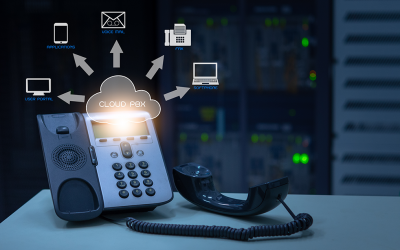Telephones and phone systems were rented from the government through the Bell Operating companies (AT&T being the biggest). In the 1960’s the first PBX was installed. Over the next two decades the entire telecommunications industry would become deregulated to allow for competition to flourish and innovation to accelerate. If you’re interested, take a deeper dive on the history here. The key word in PBX is private. This means that instead of having to rent your phone system from the government, you could have your own, private, phone system. So, the terms PBX and phone system are synonymous.
What Are The Different Phone Systems Around Today?
A Traditional PBX is:
• Premise-based – a physical server that is installed at a place of business.
• Desk phones – deployed throughout an office and connected by a cable to the phone system server.
• Proprietary – only phones made by a PBX manufacturer will work with the server that is made by the same manufacturer.
• License based – each phone and often time other features like a voicemail box require a license to work. This is an additional cost that drives up the expense of a phone system.
• Features – PBX features include auto-attendant, voicemail, and conference calling to name a few.
• Service – usually requires a certified technician on site to support the PBX.
A VoIP PBX is:
• Next generation phone system.
• Also premised-based.
• VoIP desk phones – have the same function as traditional desk phones, but, like computers, connect using an Ethernet cable and are assigned a specific IP address.
• PC App – referred to as a ‘softphone’, phone calls can now be made using a PC instead of a desk phone.
• Proprietary and license driven.
• Features – along with all of the other features of a traditional PBX, the VoIP PBX introduced early Unified Communications.
• In addition to connecting to traditional digital/analog telephone lines, VoIP PBX’s can also connecting to SIP trunks which utilize VoIP technology.
• Service – most VoIP PBX’s are supported remotely with a secure connection to the customer’s Local Area Network.
What Are The Drawbacks of Both Traditional and VoIP PBX?
• They are purchased for a relatively expensive up front cost
• Or they are leased in which there is interest charged and usually an expensive purchase option at the end of the lease.
• Obsolescence – these PBX’s start becoming obsolete as newer technology is introduced; some PBX’s can’t be upgraded and if they can the upgrade expense can be high.
What Are The Advantages of Using a Hosted PBX?
The evolution of the phone system over the last sixty is impressive as its iterations have always reflected a changing workforce. From a static, expensive, inflexible model the PBX has become an affordable, feature rich, and flexible solution for any business. Today the PBX lives in the Cloud, a virtual environment that’s always improving. Much has been written about the advantages of a hosted PBX but in short the key advantages are:
• No hardware costs except the phones themselves.
• Pay only for what you need & use. Scale up or down on demand.
• Multiple locations are supported by one phone system in the cloud.
• Most features and upgrades are included in cost.
• Quick and easy setup and installation due to minimal hardware deployment.
• Scales to your needs as you grow, using exactly what you need, when you need it
• Phone lines can be added or deleted in a matter of minutes.
• Other than phones, no maintenance required.
• Time to market is immediate when upgrades are released.
• All upgrades are made available automatically through the cloud.
• Anyone can connect from multiple devices with an Internet connection, making it easy to extend to a remote workforce. Built-in failover in the event of Internet or power loss.
• Calls automatically rerouted to other data centers so customer experience is not affected.
• Geo-redundancy is built in, with no need for a capital outlay for space, hardware, or software.
We understand that it’s a big decision when choosing the right provider for your business phone system. At Evolve Network Solutions we’re happy to answer any questions you might have as to why Evolve Complete is the right option for your business.




